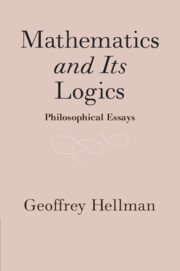Book contents
- Mathematics and Its Logics
- Mathematics and Its Logics
- Copyright page
- Contents
- Acknowledgements
- Introduction
- Part I Structuralism, Extendability, and Nominalism
- Part II Predicative Mathematics and Beyond
- Part III Logics of Mathematics
- 11 Logical Truth by Linguistic Convention
- 12 Never Say “Never”!
- 13 Constructive Mathematics and Quantum Mechanics: Unbounded Operators and the Spectral Theorem
- 14 If “If-Then” Then What?
- 15 Mathematical Pluralism: The Case of Smooth Infinitesimal Analysis
- Index
- References
11 - Logical Truth by Linguistic Convention
from Part III - Logics of Mathematics
Published online by Cambridge University Press: 26 January 2021
- Mathematics and Its Logics
- Mathematics and Its Logics
- Copyright page
- Contents
- Acknowledgements
- Introduction
- Part I Structuralism, Extendability, and Nominalism
- Part II Predicative Mathematics and Beyond
- Part III Logics of Mathematics
- 11 Logical Truth by Linguistic Convention
- 12 Never Say “Never”!
- 13 Constructive Mathematics and Quantum Mechanics: Unbounded Operators and the Spectral Theorem
- 14 If “If-Then” Then What?
- 15 Mathematical Pluralism: The Case of Smooth Infinitesimal Analysis
- Index
- References
Summary
In his influential paper, “Truth by convention,” Quine subjected the linguistic doctrine of logical truth (LD) to a critique that, to many, has seemed devastating. Having granted the conventionalist (what Quine took to be) his starting points, Quine caught his opponent in a vicious regress: to proceed from the linguistic stipulations to the (full class of) logical truths requires logical rules themselves in addition to any of the stipulations. What Lewis Carroll’s tortoise said to Achilles (on the need to appeal to modus ponens to justify any application of it) seemed an arrow in Carnap’s heel.
Carnap seems never to have taken the critique very seriously. His reply to Quine’s “Carnap and logical truth,” which repeated the upshot of “Truth by convention,” is couched in irony. Quine had found LD “empty” and “without experimental meaning”; moreover, he had found it “implying nothing not already implied by’’ the assertion – which he surely accepted – that logic is obvious.
Information
- Type
- Chapter
- Information
- Mathematics and Its LogicsPhilosophical Essays, pp. 175 - 190Publisher: Cambridge University PressPrint publication year: 2021
